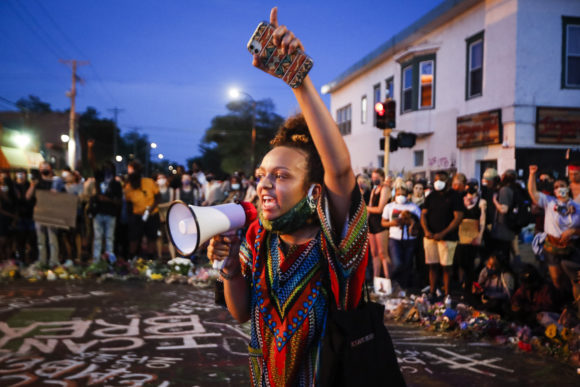Several advocacy groups presented their own recommendations to reform law enforcement practices in Minneapolis, a day after the majority of the City Council voiced support for abolishing the police department entirely in the wake of George Floyd’s death.
Minnesota’s Council on American-Islamic Relations, two Black Lives Matter chapters and the Minneapolis nonprofit Communities United Against Police Brutality were among the groups that gathered the site of the burned Third Precinct station to present more than 40 recommendations.
Under the list of recommendations, officers would be required to carry their own professional liability insurance, an idea that aims to hike out-of-pocket insurance rates for officers who engage in high-risk conduct. Some of the worst offenders would become uninsurable and forbidden from working as a police officer.
The groups also are seeking an independent agency to investigate and prosecute critical incidents involving police; mandatory psychological testing for officers; and community participation in negotiating police union contracts. They would end so-called “warrior” training for officers and the use of no-knock warrants, while banning military equipment in community policing as well as neck restraints and chokeholds.
“We’re going to be out demanding that these politicians enact these common sense, evidence-based implementable solutions now,” said Michelle Gross, president of Communities United Against Police Brutality. “They have no further excuses.”
The groups’ recommendations came a day after nine of the 12 members on the Minneapolis City Council said they back disbanding the department. The groups say abolishing one department without reforming police practices won’t be enough.
The groups call on state lawmakers, city officials, prosecutors and the state’s police licensing board to institute the changes at varying levels of government to end police brutality.
“Many of these recommendations are not new,” the report read. “Our organization has presented them many times over the years. Prior failures by leaders at the city, county and state level to adopt these evidence-based solutions are what brought us to this place.”
It added: “Every recommendation on this list is readily able to be implemented,” the report added. “All that is required is the will.”
The groups list police-community relations, residency requirements and implicit bias training as methods that do not adequately address the issue of violence by law enforcement.
Alondra Cano, one of the nine council members who said they support disbanding, called impending change “a process” that is just beginning. She invited community input.
“Nobody is saying we want to abolish health or safety,” Cano said in an interview with WCCO radio. “What we are saying is we have a broken system that is not producing the outcomes we want.”
Mayor Jacob Frey, who was booed at a rally on June 6 outside his house when he said he does not support abolishing the department, repeated that stance on June 7. In an interview with ABC’s “Good Morning America,” he said he looked forward to “deciphering” what council members mean by such talk.
He said he favors “a full-on cultural shift in how our Minneapolis Police Department and departments throughout the country function.”
“We have difficulty both terminating and disciplining officers, and then getting that termination or discipline to stick,” Frey said. “We’re going after the police union, the police union contract, the arbitration provisions that mandate that we have arbitration at the end of the process, and oftentimes that reverts the officer to right back where they were to begin with.”
The state last week launched a civil rights investigation of the department. On June 5, the council approved a stipulated agreement that immediately banned the use of chokeholds and neck restraints and included several other changes. That investigation is ongoing.
Photo: Protesters gather at a memorial for George Floyd where he died outside Cup Foods on East 38th Street and Chicago Avenue, Monday, June 1, 2020, in Minneapolis. Protests continued following the death of George Floyd, who died after being restrained by Minneapolis police officers on May 25. (AP Photo/John Minchillo)
Was this article valuable?
Here are more articles you may enjoy.


 Charges Dropped Against ‘Poster Boy’ Contractor Accused of Insurance Fraud
Charges Dropped Against ‘Poster Boy’ Contractor Accused of Insurance Fraud  Elon Musk Alone Can’t Explain Tesla’s Owner Exodus
Elon Musk Alone Can’t Explain Tesla’s Owner Exodus  US Will Test Infant Formula to See If Botulism Is Wider Risk
US Will Test Infant Formula to See If Botulism Is Wider Risk  Tesla Sued Over Crash That Trapped, Killed Massachusetts Driver
Tesla Sued Over Crash That Trapped, Killed Massachusetts Driver 